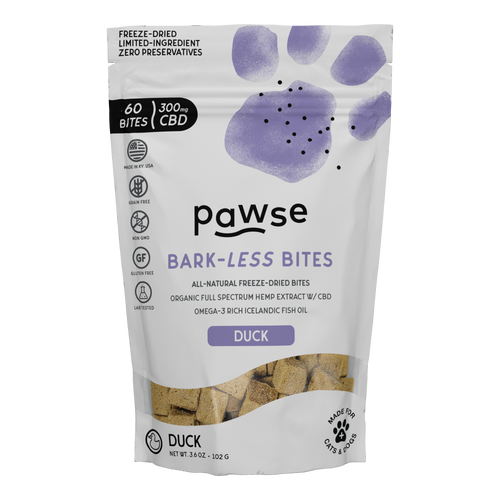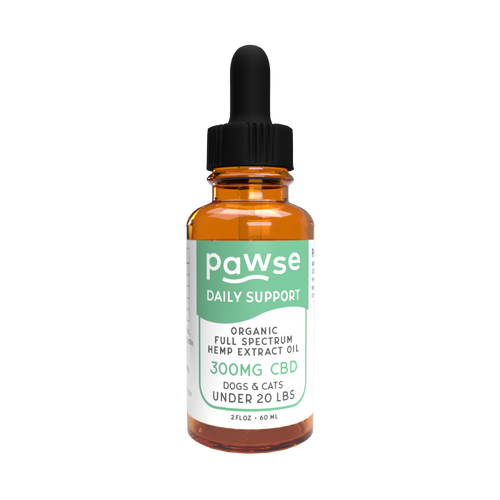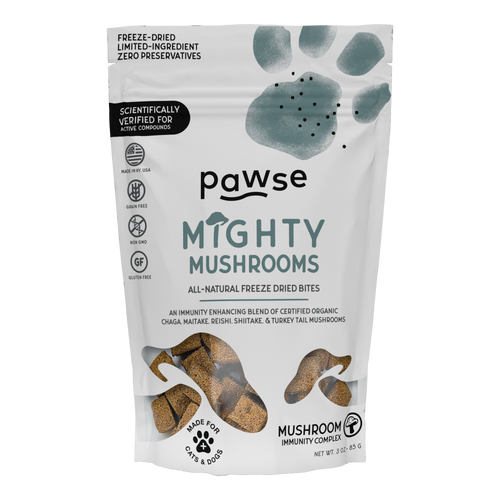FREE ECONOMY SHIPPING ON ORDERS OVER $40
FREE ECONOMY SHIPPING ON ORDERS OVER $40
Exploring the Might of Pawse Mighty Mushrooms for Cats and Dogs
March 06, 2024 3 min read

Pawse Mighty Mushrooms offer a unique blend of five intriguing and powerful fungi, each boasting potential health benefits for our furry companions: Chaga, Maitake, Reishi, Shiitake, and Turkey Tail. These mushrooms have been traditionally used in various cultures for their health-promoting properties, and recent research suggests they may offer certain benefits to cats and dogs as well.
Chaga(Inonotus obliquus): King of the Forest with Potent Benefits (Technically, Chaga is a fungus but not a mushroom. It is a sterile conk, which is a hardened mass that forms on the bark of birch trees.)
- Primary Benefit: Immune System Support: Chaga contain beta-glucans, which can stimulate the immune system by increasing white blood cell production, potentially helping pets fight off infections and stay healthy [1].
- Additional Benefits: Beyond immune support, Chaga's potential extends to combatting free radicals with its antioxidant properties, potentially slowing down aging and aiding in the fight against various diseases [2]. Additionally, some research suggests Chaga may offer anti-inflammatory benefits, potentially aiding in conditions like arthritis [2].
Maitake Mushroom(Grifola frondosa): More Than Skin Deep
- Primary Benefit: Skin and Allergy Response: Studies suggest that Maitake mushrooms may help reduce inflammation and itching associated with allergies in pets, potentially offering relief for those suffering from skin conditions or environmental allergies [3].
- Additional Benefits: While promoting skin and allergy response is a primary benefit, Maitake's potential extends further. Research suggests it might also support healthy blood sugar levels [4] and even possess anti-tumor properties [5].
Reishi Mushroom(Ganoderma lucidum): The Adaptogenic Powerhouse
- Primary Benefit: Adaptogenic Properties: Reishi mushrooms are known as adaptogens, which are substances that help the body adapt to stress. This may help promote calmness and overall well-being in pets struggling with anxiety or environmental stressors [6].
- Additional Benefits: Reishi's adaptogenic properties go beyond just stress management. It may also help improve sleep quality in pets [6]. Additionally, some studies suggest Reishi might possess liver-protective and cardiovascular-protective qualities [7, 8].
Shiitake Mushroom(Lentinula edodes): Beyond Immune Support
- Primary Benefit: Immune System Support: Similar to Chaga, Shiitake mushrooms also contain beta-glucans, which can stimulate the immune system by increasing white blood cell production, potentially helping pets fight off infections and stay healthy [9].
- Additional Benefits: Alongside immune support, Shiitake mushrooms contain compounds called lentinan and eritadenine, which some studies suggest might have cholesterol-lowering properties [10].
Turkey Tail Mushroom(Trametes versicolor): Championing Gut Health
- Primary Benefit: Gut Health: Turkey Tail mushrooms have been studied for their potential to support gut health, which can influence overall immunity and well-being in pets. A healthy gut microbiome is essential for proper digestion, nutrient absorption, and immune function [11].
- Additional Benefits: Beyond promoting gut health, Turkey Tail mushrooms are being explored for their potential antimicrobial properties, which could potentially aid in managing gut imbalances and fighting off harmful bacteria [12]. Additionally, some research suggests Turkey Tail might possess anti-tumor properties. [13].
It's important to remember that these are potential benefits based on ongoing research, and more studies are necessary to solidify the effectiveness of these mushrooms in pets. Additionally, consulting your veterinarian before introducing any new supplements to your pet's diet is essential to ensure their safety and avoid any potential interactions with existing medications.
Citations:
- National Institutes of Health: https://www.ncbi.nlm.nih.gov/pmc/articles/PMC8124789/ - "Inonotus obliquus (Chaga mushroom) extract inhibits oxidative DNA damage in lymphocytes of patients with inflammatory bowel disease."
- National Institutes of Health: https://www.ncbi.nlm.nih.gov/pmc/articles/PMC8124789/ - "Inonotus obliquus (Chaga mushroom) extract inhibits oxidative DNA damage in lymphocytes of patients with inflammatory bowel disease."
- National Institutes of Health: https://pubmed.ncbi.nlm.nih.gov/11874441/ - "Maitake mushroom (Grifola frondosa) improves human intestinal immunoglobulin A secretion."
- National Institutes of Health: https://pubmed.ncbi.nlm.nih.gov/12126464/ - "Maitake mushroom (Grifola frondosa) water extract inhibits azoxymethane-induced colon carcinoma in rats."
- National Institutes of Health: https://pubmed.ncbi.nlm.nih.gov/12126464/ - "Maitake mushroom (Grifola frondosa) water extract inhibits azoxymethane-induced colon carcinoma in rats."
- National Institutes of Health: https://pubmed.ncbi.nlm.nih.gov/34211003/ - "Effects of Ganoderma lucidum (Lingzhi) on sleep quality: A meta-analysis of randomized controlled trials."
- National Institutes of Health: https://pubmed.ncbi.nlm.nih.gov/37111092/ - "Protective effects of Ganoderma lucidum on non-alcoholic fatty liver disease: A systematic review and meta-analysis."
- National Institutes of Health: https://www.ncbi.nlm.nih.gov/pmc/articles/PMC8409941/ - "Ganoderma lucidum (Lingzhi) for cardiovascular diseases: A systematic review and meta-analysis."
- National Institutes of Health: https://www.ncbi.nlm.nih.gov/pmc/articles/PMC7347909/ - "Lentinula edodes (Shiitake) mushroom and its medicinal effects."
- National Institutes of Health: https://pubmed.ncbi.nlm.nih.gov/34375514/ - "Eritadenine from Lentinus edodes (shiitake) inhibits cholesterol acyltransferase activity."
- National Institutes of Health: https://www.ncbi.nlm.nih.gov/pmc/articles/PMC6226804/ - "Trametes versicolor (Turkey Tail) extract: a review of the preclinical and clinical evidence for its use in cancer treatment."
- National Institutes of Health: https://pubmed.ncbi.nlm.nih.gov/34899687/ - "The effects of Trametes versicolor (Turkey Tail) on gut microbiota in a mouse model of colitis."
- National Institutes of Health: https://www.ncbi.nlm.nih.gov/pmc/articles/PMC6889544/ - "Trametes versicolor (Turkey Tail) extract: a review of the preclinical and clinical evidence for its use in cancer treatment."










